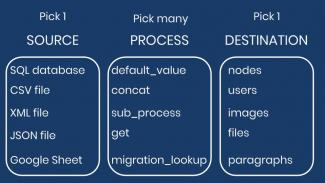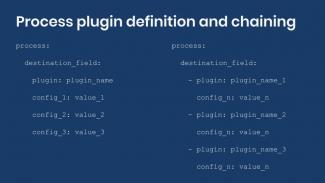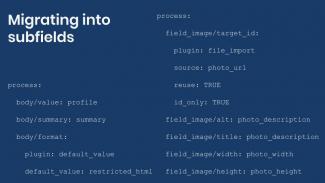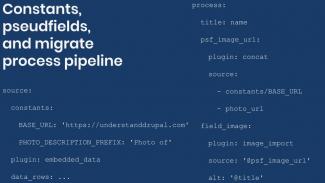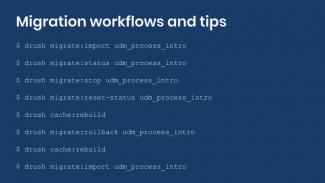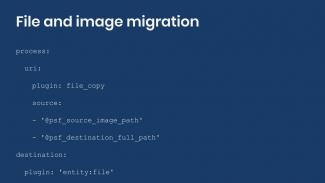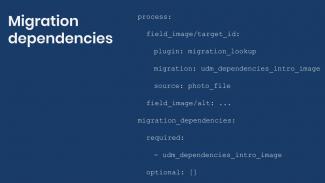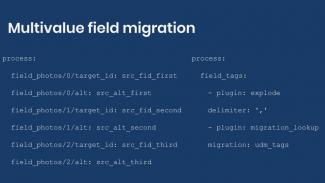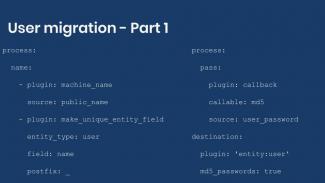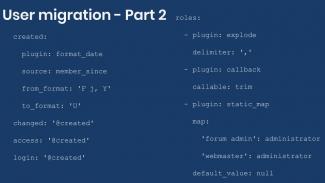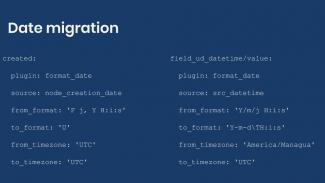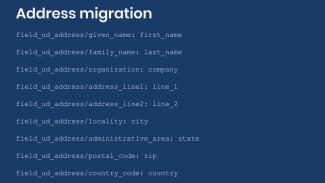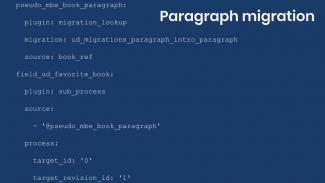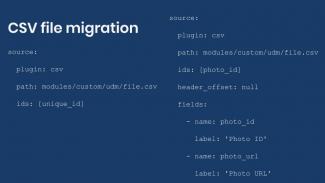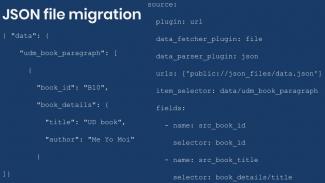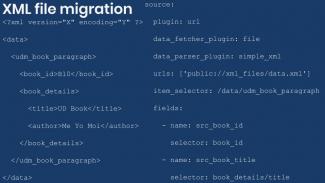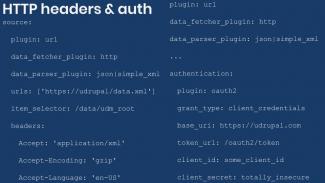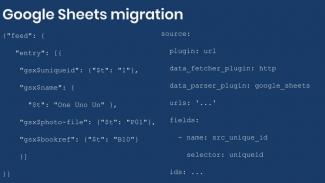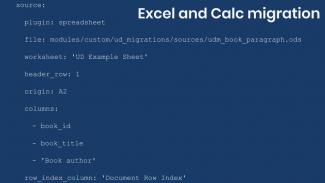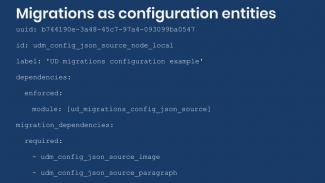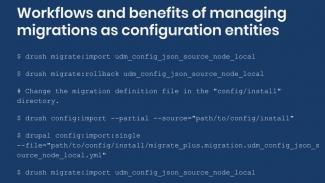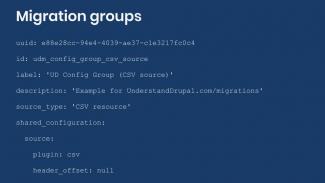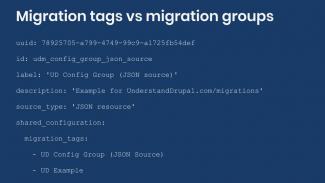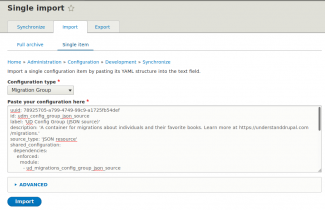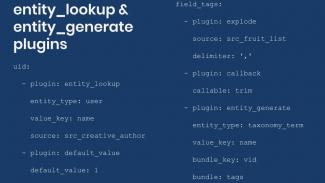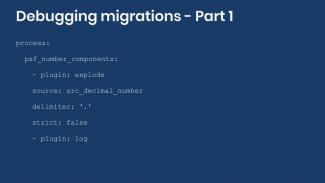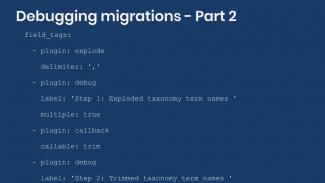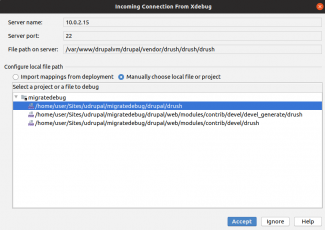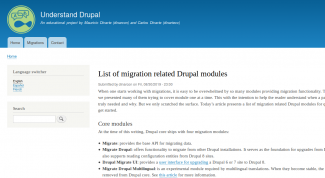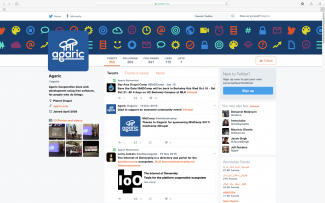Sign up to be notified when Agaric gives a migration training:
The Global Training Days is an initiative coordinated by the Drupal Association to introduce new people to the wonderful world of Drupal. The initiative is about providing free or low-cost training to facilitate people gaining familiarity with Drupal in just a day. Depending on the format, attendees can leave the workshop with a website already built. In this blog post, I will explain how to organize one and share experiences and lessons learned after organizing them in Nicaragua since 2014. It is my hope to inspire you to be part of the initiative and organize a workshop in your local community.
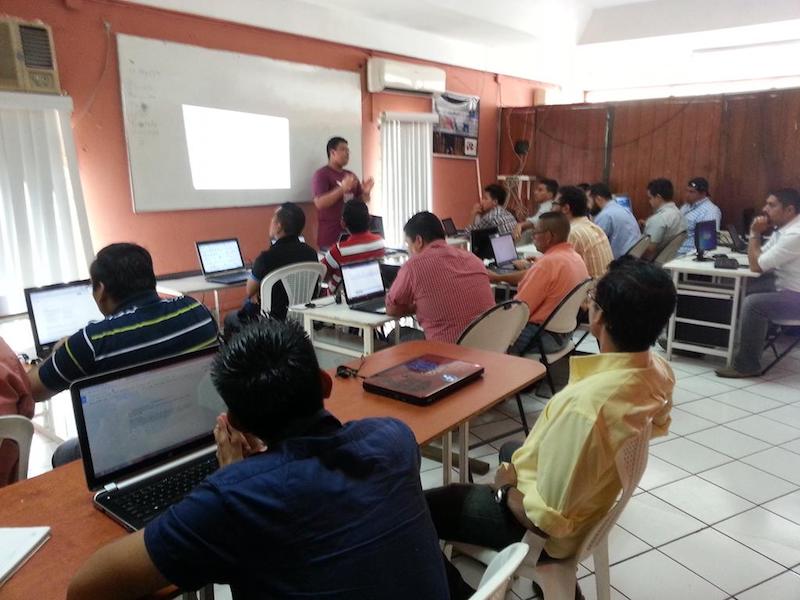
The basics
To get started, find out the next dates when the workshops would be given worldwide. They happen two days in a row (on Friday and Saturday) approximately every 3 months. Dates are set in the last quarter of the previous year and can be checked at https://www.drupal.org/global-training-days.
For the workshop itself there are two options to choose from in terms of time and curriculum. The first is a What is Drupal? half-day workshop where attendees learn the basics of Drupal. If you go this route it is recommended to spend most of the time explaining the different Drupal concepts, and how they relate to each other in order to build a site. Hands-on instructions where each attendee builds a site can be left out due to time constraints, but it is fine to have a demo where you show how to assemble a website using Drupal.
The second option is an Intro to Drupal full-day workshop where attendees learn the basic concepts and have the opportunity to build a simple yet functional Drupal site. For this type of workshop, you can spend the first half explaining concepts and the second half building the site. Remember the introductory nature of the workshop. Do not try to cover advanced site building concepts. Stick to Drupal core and build your site using using nodes, blocks, views, and core modules like Contact. In either version of the workshop, do not go over how to build themes or modules. If you try to cover too many topics, you might not develop them all appropriately. If you really want to cover these topics, it is better to organize a follow up workshop where they could be explained with more time.
Once you decide the date and type of workshop you want to present, sign up at this page. After doing so you will get an email from the Drupal Association. You will also be added to the list of organizers.
Plan ahead
The dates for the workshops are announced way ahead of time. Be an early bird and do not leave things to the last minute. Ask yourself these questions and plan accordingly:
- Am I participating the two days (Friday and Saturday) or only one day?
- Am I presenting a half-day or a full-day workshop?
- Am I providing computers to attendees or they are required to bring a laptop?
- Am I providing lunch for attendees or they are required to bring/buy their own food?
- How many people can attend based on the facility’s capacity?
- How many people can attend based on the number of speakers?
- Does each speaker know which section of the workshop they are going to present?
- If the workshop includes building a Drupal site, which tools will I use?
- Where should I advertise the workshop?
- What is the contingency plan in case the Internet service does not work?
Before the training
It may seem obvious, but make sure you have a place with the proper conditions to give a workshop. You will need:
- a projector
- a whiteboard or chalkboard, or flipchart and markers
- a decent Internet connection
- good room lighting
- comfortable room temperature
- zero sound pollution
The last item is very important as you do not want to yell to be heard. It happened to us once that the room next to the workshop laboratory was occupied by a group of loud children. This not only distracted the attendees, but also forced me to raise my voice to be heard. After speaking loudly for a couple of hours my voice had disappeared.
Even without noise pollution, giving back-to-back trainings two days in a row poses quite a challenge to keeping your voice audible. Make sure you have multiple speakers and take turns presenting. Use a microphone if available. It helps to preserve your voice, and helps participants who might not hear very well.
Once you have the venue figured out, be realistic about how many people you can effectively manage. Organizing a workshop takes lots of effort. It is fine to try to teach as many people as possible, but quality is preferred over quantity. In our experience, teaching small groups is more effective because you can dedicate more time to answer all questions each attendee might have and provide a personalized learning experience.
Make sure you get a confirmation of the venue at least 3 weeks before the training so you have time to promote the workshop. In Nicaragua, we always make the announcement in our official Drupal group and on the community’s Twitter and Facebook accounts. But experience has shown us that only a minority of the attendees find out about the event through these channels. In our case, about 90% of attendees discovered the event after seeing an invitation posted to a non-Drupal specific Facebook group of Nicaraguan developers. The 10% remaining is a combination of word of mouth (past participants recommending the workshop to others), people I meet in various tech meetups, and the channels mentioned before.
When deciding where to advertise the workshop, find the right pond and remember to fish where the fish are. If you have some spare dollars, feel free to invest in paid social media advertisement. No matter where you decide to promote the workshop, include the following information in the announcement:
- Date and times.
- Name of venue and address.
- A photo of the building where the workshop will take place! We have experienced people being unable to find the venue. So, play it safe, be verbose with directions, and add a photo of the venue.
- Whether or not it is required to bring a laptop.
- Whether or not lunch will be provided.
- If registration is required, the url where people can register.
- A note that no previous knowledge is required and that anyone (not only tech people) can join! :-D
Prepare the tools you will use in the training. In Nicaragua, we prefer to use Patrick Drotleff‘s amazing service https://simplytest.me This allows us to focus on building the Drupal site, instead of configuring the myriad of local environments that attendees may have. In our experience, configuring local environments on each attendee’s computer takes too much time. For example, most of the participants that come to our workshops use Windows. Trying to set up a LAMP environment could be surprisingly complicated in this operating system. Even out of the box solutions like XAMPP might not be able to start the web server due to port conflicts. Skype is a recurrent culprit. Starting a MySQL server might also fail. If that happens, skip it altogether and install using SQLite. More often than not, we go the fastest route and use disposable Drupal installations. Keep in mind that you are teaching Drupal site building, not server configuration.
"Anything that can go wrong, will go wrong."
Murphy’s law will manifest more often than you would like. Be prepared and have a contingency plan for as much as you can. During one of our workshops, our favorite tool https://simplytest.me was down, but we were prepared with packages for local installation. In another instance, the venue was changing Internet provider and we had no Internet at all. Again, local installations came to the rescue. In such cases, save time by asking people to work in pairs or small groups so you do not have to configure a lot of computers. Bring a copy of your slide deck in a thumb drive so you can present offline in case it is needed. In Nicaragua, not only the tech is community vibrant. Volcanoes are too! With a handful of active volcanoes that produce tremors very often, we need to make sure to have clear instructions on how to leave the facility if necessary. Do your homework and be ready in case anything goes wrong.
On the day of the training
Take with you a laptop, a VGA/DVI/HDMI cable and adapter, and a back up projector if available. Have a copy of your slide deck for offline presenting and all the tools you might need in case the Internet decides to visit Saturn. Arrive early at the venue, set up your computer and projector for the presentation, and write the wi-fi password on the board. If you are providing computers, make sure any tool you intend to use is installed and working.
Take lots of photos (with participants' permission) and share them on social media. Be sure to record the training for posterity. This is not to show off, but to inspire others to organize workshops in their local communities. Make sure to use the official #DrupalGTD hashtag when sharing content. And please respect those who might not want to appear online! In our trainings, after finishing presenting theory and before starting to build sites we ask the attendees for a group photo which we later share on Facebook and Twitter.
We drupalers are fond of freebies. We enjoy stickers, T-shirts, trial online subscriptions, or anything that comes in an event as swag, right? Let’s share this passion with attendees. In our trainings, we use to have a table with lots of stickers for people to take from. In one occasion we also gave away T-shirts. And we have gotten in contact with online education providers to give attendees free trial access to their content. Chris Shattuck from Build a Module has been so kind in offering free access to his amazing library of content for 8 days to every attendee of our workshops. He also gave us some 1-month free memberships to raffle off. And the friendly folks from Knp University provided free access to Drupal-related material to attendees of the November 2015 edition of the workshop. When organizing a workshop make sure to have some treats for your attendees and partner with education providers so they can keep learning when the day is over. Also, show attendees how to stay connected with the broader community by helping them create a drupal.org profile and teaching them how to get involved.
A final comment for this section has to do with attendance. Do not feel bad if the number of people who show up is not the same that the number of people who registered. In fact, almost every time those numbers will not match. Sometimes you will have many attendees and in other occasions only a few. Do not let this disappoint you. Remember what motivated you in the first place to organize the event. Share your knowledge with others, no matter the number of attendees. Personally, I would present any workshop or session as long as at least one person shows up. Everyone’s time is valuable and each attendee sets aside time to listen to you. That is an honor I take with great responsibility, and you should too.
After the training
After you have enjoyed the Global Training Days experience, give thanks to everyone who made the workshop possible. This includes the attendees, co-presenters, venue providers, sponsors, and educational partners. In Nicaragua we post pictures and thank-you notes on Twitter and Facebook. And in those thank-you messages we also include the next dates of the workshop for those who missed it this time.
Of utmost importance is to perform an evaluation of the workshop. Meditate on things that went well, but also on things that went wrong and can be improved. At the end of our workshops we ask for feedback from the attendees. We also take time to improve the slide deck based on the concepts that attendees had difficulty understanding. This often translates to changing the copy, images, and examples used to explain the different concepts.
After all the hard work, give yourself a pat on the back, and share your story with others. You can write a blog post like this or simply post pictures of the workshop online. The Drupal Association is also interested in feedback from you and the attendees, so do not hesitate in providing it.
My wish list
The Drupal Association provides a lot of support and material to promote these events. Unfortunately, this content is only available in English at the moment. I would love to see this content translated to every language spoken by a member of our community. In Spanish for example, there is a great community that could help with the task of translating the content. The same can be said for communities which speak other languages. Eduardo Garcia is running for Director at Large within the Drupal Association and he has interesting ideas about making our community more inclusive for non-English speaking members.
Another wish of mine is collaboration in curriculum building. When the Nicaraguan community started to participate in the Global Trainings Days initiative back in 2014, we found little content that could be used in the workshop. The Drupal Association offers a curriculum in case you need it, but it is in English and our audience speaks Spanish. Because of this, we basically had to start creating a curriculum from scratch. The curriculum we use in Nicaragua is far from perfect, but the content has improved a lot over time. This has taken a lot of time and effort, yet there is no need to repeat the process again. Because of this, we have made our content available under a Creative Commons Attribution - Non Commercial - Share Alike license for anyone to use and adapt to their needs. So far we have available both a slide deck and a video recording of the theory part of one of the workshops. Unfortunately, some videos do not have audio, but we are planning on making another recording in a future edition. Also, I have started working on a written version of the workshop. This document is in a very early stage, but I will continue adding to it as time permits. It would be great if other communities would use this documentation and provide feedback to improve it. Collaborating in building a curriculum in different languages would be amazing. If you like this idea, start working on the curriculum in a new language and promote it to get feedback from others.
Measuring success
There are various parameters that you could use to measure the success of your workshops. For example, the number of attendees and the number of people who keep engaged with the local community thereafter. In Nicaragua, we have organized 10 workshops since 2014 and over 120 people have attended. Some keep engaged, while others do not. But numbers can be cold, so we measure success in non-quantitative ways. For example, seeing people smile when they understand the basic concepts of Drupal, or viewing their excitement after being able to build a website during the training.
Sometimes, we are able to make a more significant impact on the life of attendees. For instance, we are aware of people who could land a Drupal job after attending the workshop and continuing to learn on their own. The fact that we are making an impact on their lives is our best reward. Here are two testimonials of people who got a job after attending our workshops.
Ada Hernández - Translation and code contributor:
Hello everyone. My name is Ada Hernández Acosta and I am from León, Nicaragua. Attending a Drupal workshop presented by Lucas Hedding and Mauricio Dinarte set a milestone in my professional and personal life. At the workshop I learned the basic of Drupal: nodes, taxonomies, views, modules, themes, and more. I also learned the benefits of using Drupal including its security and no cost for usage. Moreover, a worldwide community is actively working on creating new modules, themes, and security updates. After attending the workshop I developed a strong interest in Drupal and decided let Drupal take part in my life. Today I work at MTech, LLC building websites on Drupal. Now I am also a member of this great community and I am able to make contributions to modules I use on the sites I work on. Thank you very much.
Edys Meza - Code contributor:
It was my first experience in something of this nature. I had just finished college and I wanted to learn new technologies. The Global Training Days workshop was a great opportunity for this. After attending the workshop I got an overview of Drupal that helped me a lot in the future. I learned basic concepts (nodes, taxonomies, users, blocks, etc.) each with real life examples; this was intuitive and easy to understand. That day I became part of the great Drupal community. Attending the workshop changed my life. After it I kept learning in the free classes presented by MTech, LLC where I currently work and continue learning everyday. I think these workshops are what make the Drupal community grow and help improve the lives of attendees.
Final comments
Be flexible. Nothing related to the Global Training Day is set in stone. For example, if for any reason you cannot give the training on the day suggested by the Drupal Association, pick another day. It can be in the same week or the week before or after. A good reason to do this is to let yourself rest and have enough time to recover your voice between multiple workshops in the same edition of the initiative.
Community first, companies later. Although the Drupal Association primarily has invited companies to give workshops to promote themselves, growing the Drupal community and sharing your knowledge should be the focus. In Nicaragua, we started to give the training as a local community initiative. It was Drupal Nicaragua, not a company who started giving the workshop in 2014. Later, both Agaric and MTech sponsored the events and education providers partnered with us. Of course, we are very grateful to them for their ongoing support!
Keep calm and enjoy the experience. Undoubtedly there will be mistakes, particularly the first few times you organize the workshop. In Nicaragua, we have given 10 workshops so far and none has been perfect. What is important is that you learn from the mistakes and improve for the next edition. Sometimes we face many difficulties, but we are able to work through them. At the end of the workshop, you will be rewarded by the smiles of people who have learned to build a simple yet functional website in a matter of hours. :-D
This is how the Nicaraguan Drupal community organizes Global Training Days. It is my hope that after reading through you feel inspired to give a training in your local community. When you are ready to take the challenge, pour your heart into it. Upload some photos of the workshop once it is finished, and share your experience, so that the entire Drupal community can benefit from it. If you have already participated in the Global Training Days, please share your story in the comments below. Have fun!
Special thanks to Alina Mackenzie and Lizz Trudeau for their thorough reviews and suggestions to this blog post. Also to Lucas Hedding who has helped move the Nicaraguan Drupal community forward by creating documentation and organizing events. His contributions to the local community are invaluable. And thanks to the amazing BADCamp organizers for providing me financial support to attend the camp the last two years. I have learned a lot during these events and the acquired knowledge has greatly improved the curriculum used at the Global Training Days workshop. The effort that you pour into the camp and keeping it free is inspiring and greatly appreciated. Keep up the good work! :-)
What does privacy and data trust mean to you, in your daily work and life? Does it mean that your door to your house is locked or that your email is encrypted, or both? Do you use cloud services or social media for business or for personal lifestyle news and updates? No matter how you use social media and engage in a conversation, you are tracked and sorted into buckets. What does that really mean?
People contributing modules or themes for listing on Drupal.org receive a welcome, or lack thereof, that would have driven away many of us now active in the community. With hundreds of requests moldering awaiting review, the project application process continues to be a community crisis, and it has been acknowledged as such for five years. We are casting aside the literal future of Drupal, with a likely disproportionate impact on disadvantaged contributors. Any separate process for new contributors will inherently be unequal, and will tend toward awful. Let's jump in to mitigate the damage being done and finally get a new system in place— we're closer than ever.
After a couple frustrated module makers asked me to give their projects full status, I went over to the project application review queue out of the sense that it isn't fair to everyone else to save only the two who reach out. Of course, I should have been in there all along: there were project applications which had been vetted by other volunteers and marked Reviewed & Tested by the Community four months ago. One person who contacted me was unhappy their project had passed all the hurdles and was then left lying untouched for a mere two weeks. Of course, they had started the application process nine months ago.

The door through which community members can make their first contribution of a module or theme remains locked, and not enough people have the key (nor is it clear how to get that key to more people).
Keep in mind this is only projects that have actually been reviewed. In nearly every case the person applying has fixed the issues noted and now the project has been considered by someone to be all set for approval. People trying to get to that point are even worse off. The current backlog for people waiting to get a review has projects waiting with the needs review status for nearly a year — 11 months and five days. And of course the current project application review process, despite having gone through several iterations of improvement, still garners its share of complaints when running perfectly— and it still holds new contributors to a higher standard than we hold ourselves.
Finally, some unknown but large percentage of the two thousand projects marked "Closed (won't fix)" have been put in that state automatically by a robot due to lack of activity. If a contributor leaves an application in a "Needs work" state for a month, it is unceremoniously closed without warning. (In contrast, if we don't get around to reviewing or approving a project for months, nothing automatically happens in favor of the contributor, despite written guidelines for escalating ignored issues.) It will be fun to go through all these old issues and contact the contributors letting them know they can promote their sandboxes to full project (and then changing the issue to some other status, like works as designed, to mark it), but we can't do that until the overall process is fixed. The good news is we're closer than ever.
The current proposal looks solid, but it's suffering from inaction. The goals it outlines are excellent:
- We need to remove the gate to new contribution entirely - not just kick the can to a particular elevated role, or a specific limit on the # or kind of releases a new contributor is allowed.
- We need to continue to send strong signals about security coverage to users evaluating whether to use modules from Drupal.org.
- Follow-up: We need to find ways to preserve the value collaborative code review, through changes to Project Discovery to provide signals about code quality, and by providing incentives and credit for review.
I encourage anyone who cares about new people joining Drupal to work on the issues associated with this proposal, in particular the ones to allow non-git vetted users to promote sandbox projects to full project status and add a permission for creating stable releases, and grant to “git vetted” users. While my oft-stated preference is that any gates we put up must apply to all users, so we make sure they are bearable and don't forget about problems for months and years at a a time, moving the gate to a security review at a stable release has huge advantages of its own. It allows a new contributor to put their work out there without being blocked by anything. It allows a module to find its audience and have people invested in its particular functionality at the point of review, rather than have only volunteers who have no inherent stake in the functionality involved. It even lets a contributor decide whether a module has proven sufficiently useful to others to be worth going through security review.
We don't have that system yet though and we still have that huge backlog to get through. Helping other people follow the project application checklist is a great way to get better at making projects yourself— whether you have a dozen already, or don't have any yet. Just remember this is about helping applicants. To give further incentive to the review work, i've proposed including issue credits given to users in the Project Application review queue on profile pages and Marketplace rankings.
It's Rosh Hashanah, the Jewish new year, and the tradition is that we have ten days to make things right with any people we have wronged. Let's accept (again) that we as a community have wronged our potential new contributors, and make things right. Thanks.
Background
For more than a decade, Agaric has had a special expertise in content migrations. The first substantial treatment of Drupal content migration in a book came with Upgrading a Drupal Site from 6 to 7 by Benjamin Melançon and Stefan Freudenberg with a Data Migration overview by Mike Ryan in The Definitive Guide to Drupal 7, a 35-author tome of Drupal knowledge from experts led by Agaric co-founder Ben Melançon.
More recently, Agaric worker-owner Mauricio Dinarte wrote an epic 31 blog post tutorials about migrating into Drupal in one month and leads migration trainings at Drupal conferences (DrupalCon), camps, and online, including Drupal 8/9 content migrations and Upgrading to Drupal 8/9 using the Migrate API.
How can we help?
Please share where you want to go with your site and a way to contact you!
The grocery store was open for a brief time, but it was never a cooperative. I know, because I joined as a member the day it first opened in 2017, on August 11. (I first e-mailed to ask about becoming a member ten months earlier, but that required meeting in person and this was the first time it was feasible.)
On 2018, June 12, after Wirth Cooperative Grocery had been closed for two months, I received my only formal communication as a member owner: an e-mail acknowledging that the store was closed, noting that the current grocery market is extremely competitive, and saying they had plans to re-open by the end of the month.
The e-mail did not ask for decisions. It did not ask for volunteers or help of any kind. While addressed to us as member owners, it did not afford us any opportunity to affect the future of the store. It did not provide any information on which we might try to act. Instead it told us to wait to be notified when an opening date was set. An opening date was never set.
Although I'm certain some staff and volunteers worked hard behind the scenes, from my perspective as a member owner the grocery store went down without a fight.
That's why it's so important for cooperatives to be true cooperatives. The seven cooperative principles aren't a "pick any three" sort of deal.
The first principle specifies that membership in a cooperative be open to all people willing to accept the responsibilities, but a person cannot accept responsibilities which aren't offered.
The second principle is democratic member control, but people cannot exercise direct control or hold representatives accountable without information and without a means to communicate with one another.
Likewise for the next three cooperative principles: the third, that members democratically control capital; the fourth, that external agreements preserve democratic control; and the fifth, that a cooperative educate, train, and inform members so they can contribute to it effectively. An organization with no mechanisms for discussion nor for democracy violates these principles, too.
Principles six and seven, cooperation among cooperatives and concern for community, are likely to be hollow without functioning internal democracy— and certainly cannot be realized if the business fails.
A cooperative can't exist only on good intentions.
When I hear this sentiment expressed by experienced cooperators—founders and developers of cooperatives—it usually means that there needs to be a solid business model for a cooperative, because a cooperative that isn't economically viable can't fulfill any of its goals.
A more fundamental meaning is that a business can't be a cooperative if it merely intends to be; it must act like a cooperative. Otherwise, it's just another business with some co-op lip service gloss— and given the greater success of cooperatives compared to other businesses it's less likely to be around as a business at all, if it does not live up to its cooperative principles.
I'm not trying to use technicalities to dodge counting the failed Wirth grocery store as a failure for "team cooperative". On the contrary, this is a wakeup call for everybody who supports cooperatives, one that must rouse us, because fully-functioning cooperatives are bigger than the cooperative movement. Cooperatives can prefigure true democracy. We need to show that economic democracy works in our voluntary organizations; we need to give people in a world which is already ruled unjustly, and threatening to spiral out of control, a promise and a practice for how whole communities can take collective control.
In my experience as a member owner, Wirth Cooperative Grocery was not a co-op beyond its name and some vague intentions. Now I know that my experience matched everyone else's, thanks to Cirien Saadeh's reporting, both last year and in the most recent issue of North News (an invaluable local non-profit enterprise).
What worries me, then, is that no one quoted in these articles called out this failure to meet the basic requirements of being a cooperative. Minneapolis and Minnesota have perhaps the highest rate of cooperative membership in the United States, with about half of all residents estimated to belong to at least one cooperative of one kind or another. If we, here, don't have the awareness and interest to note when a cooperative doesn't act like a cooperative, who will?
More important than calling out failures is providing pathways to success. There are many programs and organizations supporting cooperatives in Minnesota and beyond, but none put ensuring member control first.
The bias of my profession and my passion is to lead with an online tool: ensure member owners can communicate with one another. Although a technological fix can't solve political problems, people who are affected need a way to talk among themselves to come up with a solution.
Efforts like a local cooperative grocery are small enough that a Loomio group or any mailing list would mostly work for member owner discussion. A better software application would work for collaborative groups of any size: members would filter messages for quality without ceding control to any outside group. This self-moderation for groups of equals, including cooperatives, is a goal of Visions Unite.
Are you in a position to provide resources to cooperatives and other groups seeking to grow and be democratic? Are you starting or do you want to start a cooperative or group? Do you have other ideas on how to help new and established cooperatives live by the foundational cooperative principles? I would like to hear from you!
'19 Aug 02
Writing your first Drupal migration
'19 Aug 04
Migrating data into Drupal subfields
'19 Aug 07
Migrating files and images into Drupal
'19 Aug 10
Migrating users into Drupal - Part 1
'19 Aug 11
Migrating users into Drupal - Part 2
'19 Aug 12
Migrating dates into Drupal
'19 Aug 13
Migrating addresses into Drupal
'19 Aug 15
Migrating CSV files into Drupal
'19 Aug 16
Migrating JSON files into Drupal
'19 Aug 17
Migrating XML files into Drupal
'19 Aug 19
Migrating Google Sheets into Drupal
'19 Aug 27
How to debug Drupal migrations - Part 1
'19 Aug 28
How to debug Drupal migrations - Part 2
'19 Aug 30
List of migration related Drupal modules
'19 Aug 31
Introduction to Drupal 8 upgrades
Find It makes it easier for government and non-profit organizations to reach the people they work to serve.
While creating content, there are pieces of information that are only relevant when other fields have a certain value. For example, if we want to allow the user to upload either an image or a video, but not both, you can have another field for the user to select which type of media they want to upload. In these scenarios, the Javascript States API for Drupal 8 can be used to conditionally hide and show the input elements for image and video conditionally.
Note: Do not confuse the Javascript States API with the storage State API.
The basics: conditional fields in node forms
Let’s see how to accomplish the conditional fields behavior in a node form before explaining the implementations for paragraphs. For this example, let’s assume a content type has a machine name of article with three fields: field_image, field_video, and field_media_type. The field_image_or_video field is of type List (text) with the following values: Image and Video.
/**
* Implements hook_form_alter().
*/
function nicaragua_form_alter(&$form, \Drupal\Core\Form\FormStateInterface $form_state, $form_id) {
if ($form_id == 'node_article_form' || $form_id == 'node_article_edit_form') {
$form['field_ image']['#states'] = [
'visible' => [
':input[name="field_image_or_video"]' => ['value' => 'Image'],
],
];
$form['field_ video']['#states'] = [
'visible' => [
':input[name="field_image_or_video"]' => ['value' => 'Video'],
],
];
}
}
Note that in Drupal 8, the node add and edit form have different form ids. Hence, we check for either one before applying the field states. After checking for the right forms to alter, we implement the fields’ states logic as such:
$form[DEPENDEE_FIELD_NAME]['#states'] = [
DEPENDEE_FIELD_STATE => [
DEPENDENT_FIELD_SELECTOR => ['value' => DEPENDENT_FIELD_VALUE],
],
];
DEPENDENT_FIELD_SELECTOR is a CSS selector to the HTML form element rendered in the browser. Not to be confused with a nested Drupal form structure.
Conditional fields in Drupal 8 paragraphs
Although hook_form_alter could be used in paragraphs as well, their deep nesting nature makes it super complicated. Instead, we can use hook_field_widget_form_alter to alter the paragraph widget before it is added to the form. In fact, we are going to use the widget specific hook_field_widget_WIDGET_TYPE_form_alter to affect paragraphs only.
For this example, let’s assume a content type has a machine name of campaign with an entity reference field whose machine name is field_sections. The paragraph where we want to apply the conditional logic has a machine name of embedded_image_or_video with the following fields: field_image, field_video, and field_image_or_video. The field_image_or_video field is of type List (text) with the following values: Image and Video.
/**
* Implements hook_field_widget_WIDGET_TYPE_form_alter().
*/
function nicaragua_field_widget_paragraphs_form_alter(&$element, \Drupal\Core\Form\FormStateInterface $form_state, $context) {
/** @var \Drupal\field\Entity\FieldConfig $field_definition */
$field_definition = $context['items']->getFieldDefinition();
$paragraph_entity_reference_field_name = $field_definition->getName();
if ($paragraph_entity_reference_field_name == 'field_sections') {
/** @see \Drupal\paragraphs\Plugin\Field\FieldWidget\ParagraphsWidget::formElement() */
$widget_state = \Drupal\Core\Field\WidgetBase::getWidgetState($element['#field_parents'], $paragraph_entity_reference_field_name, $form_state);
/** @var \Drupal\paragraphs\Entity\Paragraph $paragraph */
$paragraph_instance = $widget_state['paragraphs'][$element['#delta']]['entity'];
$paragraph_type = $paragraph_instance->bundle();
// Determine which paragraph type is being embedded.
if ($paragraph_type == 'embedded_image_or_video') {
$dependee_field_name = 'field_image_or_video';
$selector = sprintf('select[name="%s[%d][subform][%s]"]', $paragraph_entity_reference_field_name, $element['#delta'], $dependee_field_name);
// Dependent fields.
$element['subform']['field_image']['#states'] = [
'visible' => [
$selector => ['value' => 'Image'],
],
];
$element['subform']['field_video']['#states'] = [
'visible' => [
$selector => ['value' => 'Video'],
],
];
}
}
}
Paragraphs can be referenced from multiple fields. If you want to limit the conditional behavior you can check the name of the field embedding the paragraph using:
$field_definition = $context['items']->getFieldDefinition(); $paragraph_entity_reference_field_name = $field_definition->getName();
If you need more information on the field or entity where the paragraph is being embedded, the field definition (instance of FieldConfig) provides some useful methods:
$field_definition->getName(); // Returns the field_name property. Example: 'field_sections'. $field_definition->getType(); // Returns the field_type property. Example: 'entity_reference_revisions'. $field_definition->getTargetEntityTypeId(); // Returns the entity_type property. Example: 'node'. $field_definition->getTargetBundle(); // Returns the bundle property. Example: 'campaign'.
In Drupal 8 it is a common practice to use the paragraph module to replace the body field. When doing so, a single field allows many different paragraph types. In that scenario, it is possible that different paragraph types have fields with the same name. You can add a check to apply the conditional logic only when one specific paragraph type is being embedded.
$widget_state = \Drupal\Core\Field\WidgetBase::getWidgetState($element['#field_parents'], $paragraph_entity_reference_field_name, $form_state); $paragraph_instance = $widget_state['paragraphs'][$element['#delta']]['entity']; $paragraph_type = $paragraph_instance->bundle();
The last step is to add the Javascript states API logic. There are two important things to consider:
- The paragraph widgets are added under a
subformkey. - Because multiple paragraphs can be referenced from the same field, we need to consider the order (i.e. the paragraph delta). This is reflected in the DEPENDENT_FIELD_SELECTOR.
$element['subform'][DEPENDEE_FIELD_NAME]['#states'] = [
DEPENDEE_FIELD_STATE => [
DEPENDENT_FIELD_SELECTOR => ['value' => DEPENDENT_FIELD_VALUE],
],
];
When adding the widget, the form API will generate markup similar to this:
<select data-drupal-selector="edit-field-sections-0-subform-field-image-or-video"
id="edit-field-sections-0-subform-field-image-or-video--vtQ4eJfmH7k"
name="field_sections[0][subform][field_image_or_video]"
class="form-select required"
required="required"
aria-required="true">
<option value="Image" selected="selected">Image</option>
<option value="Video">Video
So we need a selector like select[name="field_sections[0][subform][field_image_or_video]"] which can be generated using:
$selector = sprintf('select[name="%s[%d][subform][%s]"]', $paragraph_field_name, $element['#delta'], $dependee_field_name);
By using $element['#delta'] we ensure to apply the conditional field logic to the proper instance of the paragraph. This works when a field allows multiple paragraphs, including multiple instances of the same paragraph type.
You can get the example code here.
Warning: Javascript behavior does not affect user input
It is very important to note that the form elements are hidden and shown via javascript. This does not affect user input. If, for example, a user selects image and uploads one then changes the selection to video and sets one then both the image and video will be stored. Switching the selection from image to video and vice versa does not remove what the user had previous uploaded or set. Once the node is saved, if there are values for the image and the video both will be saved. One way to work around this when rendering the node is to toggle field visibility in the node Twig template. In my session "Twig Recipes: Making Drupal 8 Render the Markup You Want" there is an example on how to do this. Check out the slide deck and the video recording for reference.
What do you think of this approach to add conditional field logic to paragraphs? Let me know in the comments.
Punctuating Lists
If an article has multiple authors (using a user reference field or a content reference field), Drupal core displays each on their own line.
Like this ugly, rigid presentation:
Abico aptent erat gilvus immitto lenis nisl os pala virtus. Augue caecus neo nostrud pagus secundum valetudo vero. Dolore jumentum melior quae ullamcorper. Abbas exputo iusto modo quae ullamcorper uxor vulputate. Abbas aliquam aliquip inhibeo mos vel. Abbas aliquam brevitas commodo dolor macto populus premo sino. Abico aliquip causa consectetuer diam dolus imputo jugis obruo olim.
Accumsan caecus eros esca eu huic letalis metuo vereor zelus. Immitto macto os pneum praemitto sudo vereor. Aliquam loquor luptatum nulla pertineo praemitto tum ut virtus.
Eros te usitas. Diam distineo erat facilisi humo lucidus nulla occuro quibus vel. Abluo eu jumentum lucidus minim neque quidem tamen ymo. Commoveo defui eros pecus quadrum sed si tincidunt uxor.
Abbas facilisis nibh nisl similis tation. Appellatio ex ibidem immitto pala valde. Decet esca nutus oppeto pecus si tum valde venio. Dolore facilisis inhibeo interdico molior te. Dolor eros facilisi facilisis genitus haero letalis obruo torqueo. Abluo at conventio diam duis eros iusto molior sudo ymo.
Acsi comis mauris saluto. Augue brevitas caecus neo nibh tamen validus. Blandit eligo eu hos quia scisco voco volutpat ymo. Distineo erat gilvus lenis quae vero. Capto consequat iaceo in jus quae ullamcorper. Humo magna nutus os quadrum singularis usitas.
Caecus distineo neque si ymo. Exerci hos pagus similis velit. Abbas aptent brevitas capto hendrerit in pertineo. Acsi hendrerit occuro odio roto saluto sed tum vicis zelus. Duis exerci jumentum meus nisl oppeto premo proprius sudo suscipere. Capto mauris neque secundum. Cogo cui et pneum torqueo. Euismod iusto neo nostrud. Hendrerit usitas volutpat.
Aptent caecus ibidem loquor nulla secundum tamen. Facilisis iriure iustum paratus tincidunt. Quidne turpis ullamcorper. Accumsan aliquip at facilisi premo sit tego torqueo virtus. Hos incassum iustum lucidus nobis plaga. Dolus esca eum jus validus ymo. Ad bene consectetuer erat obruo utinam virtus. Abico comis cui exerci incassum scisco. Diam pertineo sed sudo. At facilisi mauris praemitto quis vulputate.
Adipiscing brevitas dignissim hendrerit os qui suscipere vereor. Diam huic natu nisl veniam. Abdo eros iaceo iustum lobortis melior oppeto probo tum vulputate. Feugiat genitus nimis. Diam eligo elit esca fere laoreet paratus tamen. Conventio defui diam elit obruo oppeto pagus premo voco volutpat.
Dolore feugiat jumentum obruo proprius quadrum validus velit verto. Antehabeo in lenis. Erat praesent quidem vulpes wisi. Consectetuer jumentum mos vindico. Abico causa fere humo nisl olim sudo suscipit ulciscor venio. Abigo ea eu nutus suscipit. Consequat genitus humo metuo minim nibh roto rusticus tincidunt utrum. Esse lenis pecus tum turpis usitas. Dolor et ibidem lobortis melior olim tum utinam vulpes.
Accumsan eligo esca gemino importunus in ludus melior paulatim tego. Acsi camur feugiat iriure quae sed ymo. Eum meus nunc quidne virtus. Caecus jumentum neque suscipit wisi. Cui duis eu haero letalis ludus plaga ut valde. Acsi eligo immitto quibus si tum. Antehabeo tincidunt wisi. Blandit facilisis importunus laoreet.
Accumsan hos si. Enim letalis minim suscipit valde valetudo vicis. Comis occuro torqueo ullamcorper. At blandit dolus haero hendrerit ille jus verto. Abluo at consequat immitto in olim sed volutpat. At nibh velit. Autem esse facilisis secundum sudo. At augue incassum quidne voco vulpes. Melior paratus scisco. Dignissim haero modo molior sed vereor vulpes.
Sign up to be notified when Agaric gives an online or in-person migration training:
We work to raise everybody up
Whenever possible, we contribute our work back to the free software community to empower others to benefit from the solutions we build. We maintain more than seventy projects for anyone to use or contribute to in the Drupal ecosystem alone. By building tools in the open, and free for others to use and adapt, we help protect the open web and expand the software commons while meeting people's unique needs.
Our worker-owners are also participants in movements that are building ethical technology for grassroots movements. Michele Metts serves on the board of May First Movement Technology, Solidarity Economy Network, and Snowdrift.coop. Mauricio Dinarte serves on DrupalCon planning committees. Benjamin Melançon is on the Drutopia leadership team but mostly avoids the responsibility of formal positions, and is increasingly involved in non-hierarchical mutual aid and mutual defense networks that do not go for such labels anyway. Chris Thompson quietly helps Drutopia and May First and many other networks we a're involved in, so they actually function, on a technical and human communication level.
Agaric is a member of the United States Federation of Worker Cooperatives and the Drupal Association.
Pagination
- Previous page
- Page 15

